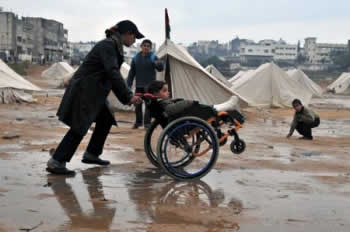 Pal Telegraph– Former soldier in the Israeli army Elik Elhanan regrets the moment his mother was “happy and proud” when he joined the military service in the occupied Palestinian territories. Elhanan is now a spokesperson for the “Combatants for Peace” movement, which aims to “end the cycle of violence, the bloodshed and the [Israeli] occupation”.
Pal Telegraph– Former soldier in the Israeli army Elik Elhanan regrets the moment his mother was “happy and proud” when he joined the military service in the occupied Palestinian territories. Elhanan is now a spokesperson for the “Combatants for Peace” movement, which aims to “end the cycle of violence, the bloodshed and the [Israeli] occupation”.
His experience, along with those of other Palestinian activists, is part of the Italian filmmaker Barbara Cupisti’s 2008 documentary titled, “Forbidden Childhood”, which was screened at the Royal Film Commission last week. The film sheds light on the “suffering” of Palestinian children living under Israeli occupation, and endure Israeli settlers’ persecution in the Palestinian territories. In the movie, Elhanan says he was “disappointed” as his mother asked him not to join the army in the beginning. But she ended up being “proud” when he did. The activist says he has grown to prefer a “nonviolent” way in addressing the Palestinian-Israeli conflict, rather than fighting, which has been taking place in the region since Israel was established on the ruins of Palestine in 1948.
“In Israel, mothers should not support their kids to become battle killers,” Elhanan says in the documentary, adding that by encouraging them to join the military, mothers “sacrifice” their children. “We did not feel that we are protecting anyone in the occupied territories,” he noted, underscoring the “hard way” of living which Palestinian children are enduring under occupation.
Meanwhile, Palestinian ex-fighter Ali Abu Awwad had a different experience. His mother, a member of the Fateh movement, was captured by the Israelis when he was 10 years old. During the second Intifada in 2000, Israeli soldiers captured Abu Awwad in an attempt to get information on his mother’s activity.
Now, the 31-year-old activist is a leading member of Al Tariq (the road), a pacifist movement which seeks to reach a peaceful solution to the conflict. As part of his attempts to achieve the movement’s goal and spread a “culture of nonviolence” in the war-stricken region, Abu Awwad appears in the film talking to Zakaria Zubaidi, a young man from the Jenin refugee camp in the West Bank.
For seven years, Zubaidi was a leader in the Fateh-affiliated Al Aqsa Martyrs Brigades. Zubaidi’s life as a fighter against the occupation started in 1989, when he was shot in the leg by Israeli soldiers while on his way home from school. “People then overrated me and made a hero out of me,” he says in the movie, adding that he started to feel himself an adult from that time.
At the age of 14, Zubaidi was arrested by the Israelis, which made him feel like a “politician”, he noted, adding that his story is told by many children in the Palestinian territories. “Today, Palestinian children are not afraid of anything, they have no fear because they have lost their childhood,” Zubaidi tells Abu Awwad in the 90-minute film, which shows movie segments of children throwing stones at Israeli soldiers, and others arguing with settlers in the West Bank. “Bitch,” shouted an Israeli settler at a young Palestinian girl as the latter switched on her camera to document the “persecution moment”, which was part of the documentary.
The film received the audience award for the Best Documentary Film at the 2009 Bahrain International Human Rights Film Festival. In June, it was awarded the Amnesty International Cinema and Human Rights Award at the Pesaro International Film Festival for new cinema. Cupisti embarked on the film in an attempt to further explain to the Europeans aspects of the Arab-Israeli conflict, she told the Amman audience Monday.
“In Europe, we have no clear information about the struggle in the Middle East,” remarked Cupisti. In a discussion following the screening, the film received different reactions from the Amman audience, which included Jordanians as well as foreigners. As one woman lauded the film, describing it “inspiring”, another man slammed it claiming it “harms the Palestinian cause and over five million Palestinian refugees” around the world.
“It does not distinguish between the victim and the executioner,” he objected. Another member of the audience said he believed Abu Awwad’s activities will not have any effect on the entire conflict. “What can your movement do when a Palestinian goes out and gets killed?” he asked Abu Awwad, who attended the screening. “I am talking about the art of utilising our suffering… We are negotiating with the Israelis without having any clear strategy, and we also kill them with no strategy,” Abu Awwad replied.
He added that any nation has the right to resist occupation “in the way they choose”, noting that he does not prefer “peace conferences full of hugs” between representatives of the warring sides, but rather a “popular movement to reach the [Palestinian] state”. “If talking to the devil can achieve a state, I do not mind talking to the devil,” Abu Awwad told the Amman audience.

